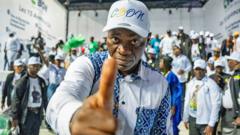In a remarkable turnaround within the African political landscape, Gabon stands poised for a democratic transition as it prepares for a presidential vote just over 19 months post a peaceful coup that severed over five decades of Bongo family rule. On Saturday, citizens will cast their votes, a step that contrasts sharply with the trend of military leaders in the region holding tightly onto power.
At the forefront of this electoral battle is Brice Clotaire Oligui Nguema, the very man behind the coup. Transitioning from military attire to a politician's suit, the former commander of the elite Republican Guard has garnered significant popularity, buoyed both by the desire for a break from dynastic control and by the favorable electoral conditions that disqualified rival candidates. Oligui Nguema's campaign slogan, “C'BON,” cleverly plays on the French phrase for “it's good,” signaling a fresh optimism.
Oligui Nguema's ascendance has been marked by seemingly effortless popularity. Should he win, he will embark on a seven-year mandate with the promise of initiating development reforms in a nation rich in oil and manganese but where significant poverty persists. Gabon’s recent history, devoid of major conflict except for a 2016 post-election crackdown, plays to this transitional leader’s advantage.
The coup unfolded after the electoral authorities declared the incumbent President, Ali Bongo Ondimba, the victor of a disputed election, igniting widespread skepticism among the populace. The interim government’s decision to detain Bongo’s family and prevent continued dynastic rule was met with public relief and celebrations in the streets.
What sets Oligui Nguema apart from other military rulers is his strategic outreach to various sectors of society, including past government figures and civil society voices. This approach has fostered a transitional government that has, so far, refrained from the oppressive tactics often seen in countries like Mali and Guinea.
Furthermore, his government has maintained amicable relations with France, promoting collaboration on military and development initiatives. Oligui Nguema’s administration has also shown a willingness to embrace public works and development projects aimed at addressing citizens’ needs, setting the stage for a potentially transformative leadership.
However, as the election approaches, the new leader will face significant challenges. High public expectations and the pressure to balance economic growth with environmental preservation will be critical. Gabon is known for its commitment to rainforest conservation, an area that Oligui Nguema needs to negotiate wisely against the backdrop of economic demands.
With a clear consensus on democratic reforms and a desire to eliminate dynastic succession from the political fabric, the Gabonese people are at a crossroads. Oligui Nguema must navigate the complexities of governance, understanding that the hopes pinned on him will require genuine effort to overhaul a system that many view as long overdue for change.
Paul Melly, an Africa analyst, emphasizes that the real work for Oligui Nguema begins now, with expectations high and the path forward fraught with potential and uncertainty.
At the forefront of this electoral battle is Brice Clotaire Oligui Nguema, the very man behind the coup. Transitioning from military attire to a politician's suit, the former commander of the elite Republican Guard has garnered significant popularity, buoyed both by the desire for a break from dynastic control and by the favorable electoral conditions that disqualified rival candidates. Oligui Nguema's campaign slogan, “C'BON,” cleverly plays on the French phrase for “it's good,” signaling a fresh optimism.
Oligui Nguema's ascendance has been marked by seemingly effortless popularity. Should he win, he will embark on a seven-year mandate with the promise of initiating development reforms in a nation rich in oil and manganese but where significant poverty persists. Gabon’s recent history, devoid of major conflict except for a 2016 post-election crackdown, plays to this transitional leader’s advantage.
The coup unfolded after the electoral authorities declared the incumbent President, Ali Bongo Ondimba, the victor of a disputed election, igniting widespread skepticism among the populace. The interim government’s decision to detain Bongo’s family and prevent continued dynastic rule was met with public relief and celebrations in the streets.
What sets Oligui Nguema apart from other military rulers is his strategic outreach to various sectors of society, including past government figures and civil society voices. This approach has fostered a transitional government that has, so far, refrained from the oppressive tactics often seen in countries like Mali and Guinea.
Furthermore, his government has maintained amicable relations with France, promoting collaboration on military and development initiatives. Oligui Nguema’s administration has also shown a willingness to embrace public works and development projects aimed at addressing citizens’ needs, setting the stage for a potentially transformative leadership.
However, as the election approaches, the new leader will face significant challenges. High public expectations and the pressure to balance economic growth with environmental preservation will be critical. Gabon is known for its commitment to rainforest conservation, an area that Oligui Nguema needs to negotiate wisely against the backdrop of economic demands.
With a clear consensus on democratic reforms and a desire to eliminate dynastic succession from the political fabric, the Gabonese people are at a crossroads. Oligui Nguema must navigate the complexities of governance, understanding that the hopes pinned on him will require genuine effort to overhaul a system that many view as long overdue for change.
Paul Melly, an Africa analyst, emphasizes that the real work for Oligui Nguema begins now, with expectations high and the path forward fraught with potential and uncertainty.



















